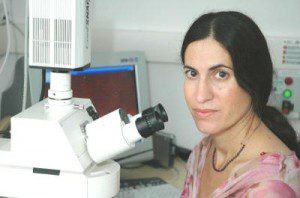 Researchers in Jerusalem have identified a possible cure for Type 1 diabetes in the form of a signal that activates regeneration of pancreatic beta cells, which are responsible for producing insulin. The research team claims that the discovery could pave the way for treating Type 1 diabetes by restoring or increasing pancreatic beta cell function.
Researchers in Jerusalem have identified a possible cure for Type 1 diabetes in the form of a signal that activates regeneration of pancreatic beta cells, which are responsible for producing insulin. The research team claims that the discovery could pave the way for treating Type 1 diabetes by restoring or increasing pancreatic beta cell function.
The study, which took place over a period of several years, was led by Professor Yuval Dor with the Hebrew University of Jersualem Institute for Medical Research Israel-Canada. Also working on the project were researchers with the Hadassah University Medical Center, and Roche, a research-focused pharmaceuticals company. The study was funded by the Juvenile Diabetes Research Foundation.
“Our work shows that as the glucose level is increased in the blood, it tells the beta cells to regenerate,” said Professor Dor. “It’s not blood glucose per se that is the signal, but the glucose-sensing capacity of the beta cell that’s the key for regeneration.”
The research shows for the first time that high glucose levels in the blood are a trigger that initiates the regeneration of pancreatic beta cells. These cells are attacked by the immune systems of individuals with Type 1 diabetes; the destruction of the cells means that the individual cannot produce as much insulin, resulting in a disruption in the body’s handling of blood glucose. The glucose cannot be absorbed into cells and used for energy, so the patient must receive insulin injections, usually several times a day, to compensate for lowered insulin production. To reverse the effects of Type 1 diabetes, the pancreatic beta cells need to be regenerated and enlarged.
The research team used diabetic mice to study the effects of elevated blood glucose levels on individuals with Type 1 diabetes. They found that diabetic mice with elevated blood glucose levels had regenerated more beta cells than did the mice without diabetes, which seems to suggest that glucose is a key component in the regeneration of beta cells. The research also showed that glucokinase, an enzyme that senses the presence of glucose, is an important compound in activating the beta cell regeneration process.
“This means that the more work that beta cells are required to do, the more of themselves they make,” said Shay Porat, a graduate student who spearheaded the study along with Noa Weinberg, another student. As existing beta cells found it more difficult to keep up with their work load, they initiated the regeneration of more beta cells.
As the study demonstrated the central role that glucokinase plays in beta cell regrowth, it could pave the way for therapeutics that manage the levels of that enzyme and encourage existing beta cells to replicate.
Even more exciting, the research could lead to therapies that prevent the immune system from destroying the beta cells in the first place, which would constitute a cure for Type 1 diabetes.
According to Professor Aaron Hanukoglu with Tel Aviv University’s Sackler Medical School, “The incidence of Type 1 has been rising persistently for several decades in many countries around the world including Israel, and many research groups are trying to find a cure or prevention for this chronic disease. This Jerusalem research on mice is very elegant and laborious, and if proven true in humans, it may lead to development of therapeutic measures for regeneration of pancreatic beta cells and a cure to juvenile-onset diabetes.”